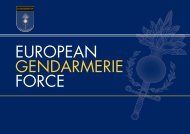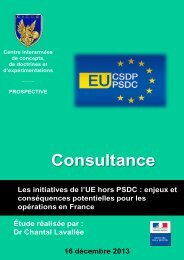Conference
science-research-bulletin-2013-conference
science-research-bulletin-2013-conference
Create successful ePaper yourself
Turn your PDF publications into a flip-book with our unique Google optimized e-Paper software.
EUROPEAN POLICE SCIENCE AND RESEARCH BULLETIN<br />
SPECIAL CONFERENCE EDITION<br />
Figure 5. Number of police officers per capita and trust in the police in 16 European countries 2010.<br />
Sources: European Sourcebook of Criminal Justice and European Social Survey.<br />
that case, the country-level correlation is -.66<br />
(Figure 5). Therefore, the more police officers<br />
per inhabitant, the less the citizens trust them.<br />
4. QUALITY OF GOVERNANCE<br />
A central factor generating trust in public<br />
administration is its ability to treat citizens<br />
fairly and justly. This means equal treatment<br />
of citizens regardless of their social status,<br />
ethnic background, age, gender or any other<br />
background factor (Rothstein & Teorell, 2008).<br />
Corruption can be considered a sign of the<br />
administration’s inability to treat citizens<br />
equally and impartially, and it can be seen as<br />
an important indicator of the general quality<br />
of administration (Holmberg et al., 2009). As<br />
we can see from Figure 6, the corruption of<br />
the administration seems to have a fairly strong<br />
connection with the trust in police on a country<br />
level; the correlation coefficient is as high as .91.<br />
Here the Corruption Perception Index 2010 of<br />
Transparency International is used as an indicator<br />
for corruption. The scale of the indicator is<br />
constructed so that a high value indicates a low<br />
level of corruption.<br />
5. SOCIAL CAPITAL<br />
Trust in police means that we trust in the formal<br />
aspects of social control. On the other hand, we<br />
must keep in mind that the aspects of informal<br />
social control are at least equally important.<br />
If we have social capital, this means that we are<br />
members of several social networks, and that we<br />
have learned to trust the people around us. We<br />
trust not only those whom we know personally,<br />
we trust people in general. This is referred to as<br />
generalised trust (see Nannestad 2008; Paxton<br />
2007). Social capital can therefore be seen as a<br />
resource for an individual, offering both unofficial<br />
social support and unofficial social control for<br />
the members of the community. Trust promotes<br />
interaction, which in turn increases trust. (See<br />
e.g. Putnam 2001 and Field 2004) Studies have<br />
also shown that the official social support offered<br />
by the society and the unofficial support from<br />
the immediate community do not exclude each<br />
other; on the contrary, they complement and<br />
support each other. Social capital has been found<br />
to be the strongest in countries with the most<br />
support for the welfare of the people thanks to<br />
the public welfare policy (Oorschot and Van Arts,<br />
2005; Kääriäinen & Lehtonen 2006)<br />
96





